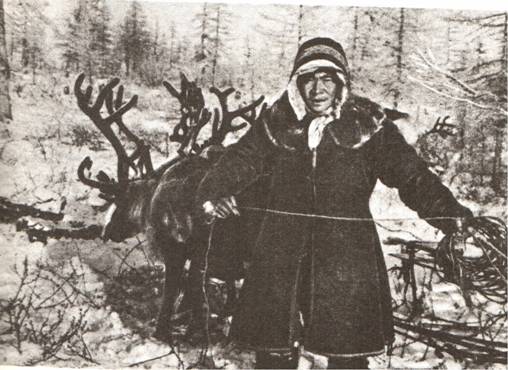Dolgans on:
[Wikipedia]
[Google]
[Amazon]
 Dolgans (; Dolgan: , , ( Sakha); Yakut: ) are an ethnic group who mostly inhabit
Dolgans (; Dolgan: , , ( Sakha); Yakut: ) are an ethnic group who mostly inhabit 
 Dolgans (; Dolgan: , , ( Sakha); Yakut: ) are an ethnic group who mostly inhabit
Dolgans (; Dolgan: , , ( Sakha); Yakut: ) are an ethnic group who mostly inhabit Krasnoyarsk Krai
Krasnoyarsk Krai ( rus, Красноя́рский край, r=Krasnoyarskiy kray, p=krəsnɐˈjarskʲɪj ˈkraj) is a federal subject of Russia (a krai), with its administrative center in the city of Krasnoyarsk, the third-largest city in ...
, Russia
Russia (, , ), or the Russian Federation, is a transcontinental country spanning Eastern Europe and Northern Asia. It is the largest country in the world, with its internationally recognised territory covering , and encompassing one-eigh ...
. They are descended from several groups, particularly Evenks
The Evenks (also spelled Ewenki or Evenki based on their endonym )Autonym: (); russian: Эвенки (); (); formerly known as Tungus or Tunguz; mn, Хамниган () or Aiwenji () are a Tungusic people of North Asia. In Russia, the Ev ...
, one of the indigenous peoples of the Russian North. They adopted a Turkic language sometime after the 18th century. The 2010 Census counted 7,885 Dolgans. This number includes 5,517 in former Taymyr Autonomous Okrug.
Dolgans speak the Dolgan language
The Dolgan language is a Turkic language with around 1,000 speakers, spoken in the Taymyr Peninsula in Russia. The speakers are known as the Dolgans. The word "Dolgan" means 'tribe living on the middle reaches of the river'. This is most ...
, which is closely related to the Yakut language
Yakut , also known as Yakutian, Sakha, Saqa or Saxa ( sah, саха тыла), is a Turkic language spoken by around 450,000 native speakers, primarily the ethnic Yakuts and one of the official languages of Sakha (Yakutia), a federal republic ...
.

History
In the 17th century, the Dolgans lived in the basins of the Olenyok River and Lena River. They moved to their current location, Taymyr, in the 18th century. The Dolgan identity began to emerge during the 19th and early 20th centuries, under the influence of three groups who migrated to the Krasnoyarsk area from the Lena River and Olenyok River region:Evenks
The Evenks (also spelled Ewenki or Evenki based on their endonym )Autonym: (); russian: Эвенки (); (); formerly known as Tungus or Tunguz; mn, Хамниган () or Aiwenji () are a Tungusic people of North Asia. In Russia, the Ev ...
, Yakuts
The Yakuts, or the Sakha ( sah, саха, ; , ), are a Turkic ethnic group who mainly live in the Republic of Sakha in the Russian Federation, with some extending to the Amur, Magadan, Sakhalin regions, and the Taymyr and Evenk Districts ...
, Enets, and so-called tundra peasants ().
Culture and livelihood
Originally, the Dolgans werenomadic
A nomad is a member of a community without fixed habitation who regularly moves to and from the same areas. Such groups include hunter-gatherers, pastoral nomads (owning livestock), tinkers and trader nomads. In the twentieth century, the po ...
hunters and reindeer
Reindeer (in North American English, known as caribou if wild and ''reindeer'' if domesticated) are deer in the genus ''Rangifer''. For the last few decades, reindeer were assigned to one species, ''Rangifer tarandus'', with about 10 subsp ...
herders. However, they were prevented from following a nomadic lifestyle during the Soviet
The Soviet Union,. officially the Union of Soviet Socialist Republics. (USSR),. was a transcontinental country that spanned much of Eurasia from 1922 to 1991. A flagship communist state, it was nominally a federal union of fifteen national ...
era and required to form '' kolkhozy'' (rural collectives) that – in addition to their traditional activities – engaged in reindeer breeding, fishing
Fishing is the activity of trying to catch fish. Fish are often caught as wildlife from the natural environment, but may also be caught from stocked bodies of water such as ponds, canals, park wetlands and reservoirs. Fishing techniques ...
, dairy farming
Dairy farming is a class of agriculture for long-term production of milk, which is processed (either on the farm or at a dairy plant, either of which may be called a dairy) for eventual sale of a dairy product. Dairy farming has a history th ...
and market gardening. In 1983, the anthropologist Shirin Akiner claimed: "Dolgans enjoy full Soviet citizenship. They are found in all occupations, though the majority are peasants and collective farm workers. Their standard of housing is comparable to that of other national groups in the Soviet Union."
Religion
Most Dolgans practise oldshamanistic
Shamanism is a religious practice that involves a practitioner (shaman) interacting with what they believe to be a Spirit world (Spiritualism), spirit world through Altered state of consciousness, altered states of consciousness, such as tranc ...
beliefs; however, most are influenced by Eastern Orthodox Christianity
Eastern Orthodoxy, also known as Eastern Orthodox Christianity, is one of the three main branches of Chalcedonian Christianity, alongside Catholicism and Protestantism.
Like the Pentarchy of the first millennium, the mainstream (or " canoni ...
.
Notable Dolgans
* Ogdo Aksyonova – a poet, the founder of Dolgan literatureSee also
*Dolgan language
The Dolgan language is a Turkic language with around 1,000 speakers, spoken in the Taymyr Peninsula in Russia. The speakers are known as the Dolgans. The word "Dolgan" means 'tribe living on the middle reaches of the river'. This is most ...
References
Ethnic groups in Russia Turkic peoples of Asia Indigenous peoples of North Asia Indigenous small-numbered peoples of the North, Siberia and the Far East Modern nomads {{Russia-stub